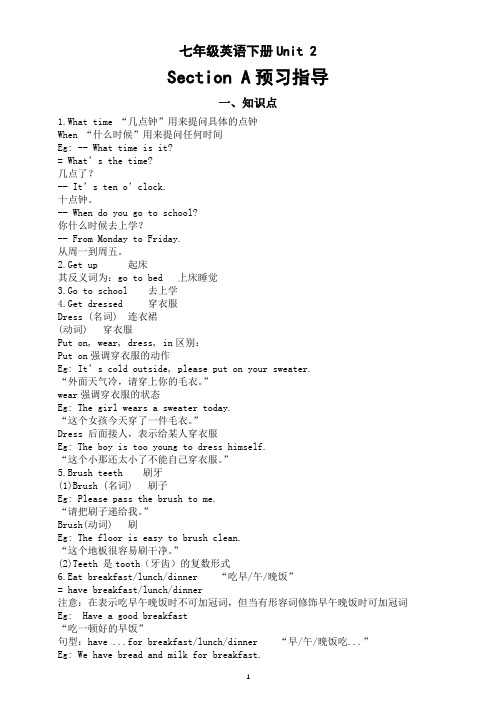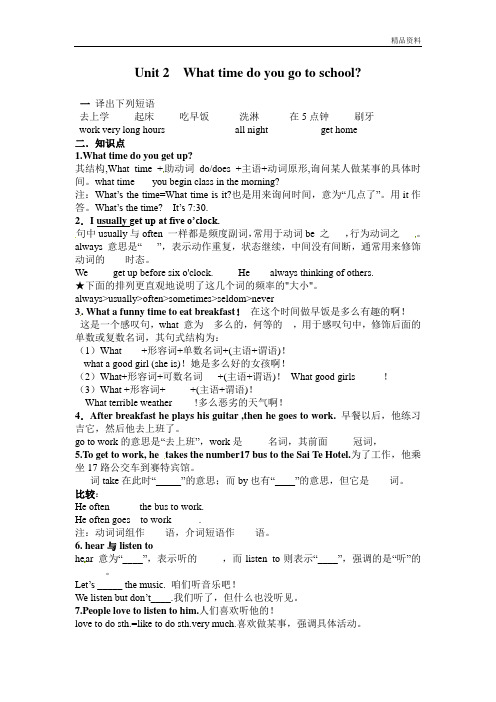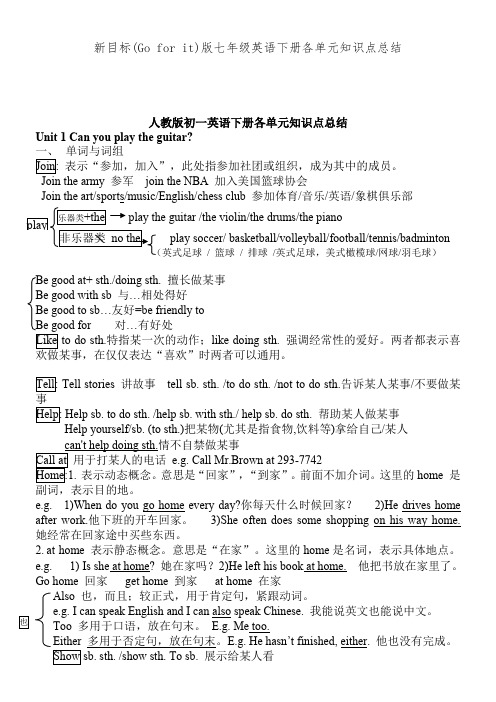新目标七年级英语下册Unit2复习
(完整版)新版新目标英语七年级下册unit2知识点总结

Unit 2 What time do you go to school?Section A1.get dressed 穿衣服表示穿的动作be dressed in+颜色/衣服穿着表示穿的状态2.brush one’s teeth 刷牙brush n 刷子brushes v 刷take a shower=have a shower 洗澡3.(1)what time 几点问具体时间,一般回答要具体到小时(2)when对时间提问,询问日期、月份、年份,回答既可是具体的时间,也可是不具体的时间,in the morning,last year,in 1998 等范围大的时间,When does he take a shower?他什么时候洗澡?He takes a shower in the morning. 他在早上洗澡。
I take a shower at 6 o’clock in the morning.我早上六点洗澡。
4.at in on(1)at + 具体时间点,在几点(几分)固定搭配at 7:00 at night at noon(2)in + 时间段(周,年份,月份,季节,早中晚)in 1942 in the morning in May(3)on + 星期/日期/节日或具体某一天的早中晚on a cold winter night on Children’s Day on Monday5. always usually often sometimes 频度副词,常用于动词be 助动词或情态动词之后,行为动词之前。
(1)always(100%) 总是、永远,表动作重复,状态继续,中间没间断,通常修饰动词的一般时态。
若修饰进行时,则有“老是”,“再三地”的意思,带有厌烦、不满、赞美等感情色彩。
(2)usually(80%)通常,着重表示已习惯的动作。
反义词unusually(3)often(60%)时常、经常,表示常常这样,但不总是这样,反义词seldom(4)sometimes(30%)有时、不时,说明的是偶尔发生的事情或情况。
人教版新目标英语七年级下1-2单元复习

Unit One复习词组1. 你哥哥的笔友 your brother’s pen pal2. 来自于…… come from = be from3. 居住在…… live in4. 说一点儿法语 speak a little French5. 他笔友最喜欢的语言 his pen pal’s favorite language6. 在周末 on weekends7. 告诉我你自己的情况 tell me about yourself 8. 什么语言 what language9. 给我写信 write (a letter) to me 10. 喜欢/不喜欢做某事 like doing / dislike doing sth. 课文句子1.Where is your pen pal from = Where does your pen pal come from?你的笔友来自哪里?She is from Japan.= She comes from Japan. 她来自日本。
2.Where does your pen pal live ? 你笔友居住在哪里?He lives in Sydney.他住在悉尼。
3.What language do you speak ? 你说什么语言? I speak Chinese.我说汉语。
4.What language can you speak?你会说什么语言?I can speak Chinese and a little English. 我会说汉语和一点点英语。
5.Does she have any brothers or sisters? 她有兄弟姐妹吗?Yes,she does. She has two brothers and two sisters. 是的,她有兄弟姐妹。
她有两个哥哥和两个妹妹。
6.What’s her favorite subject in school ?她在学校最喜欢的学科是什么?Her favorite subject in school is math.她在学校最喜欢的学科是数学。
初中英语人教新目标七年级下册Unit 2 Section A预习指导(知识点+练习题)

七年级英语下册Unit 2Section A预习指导一、知识点1.What time “几点钟”用来提问具体的点钟When “什么时候”用来提问任何时间Eg: -- What time is it?= What’s the time?几点了?-- It’s ten o’clock.十点钟。
-- When do you go to school?你什么时候去上学?-- From Monday to Friday.从周一到周五。
2.Get up 起床其反义词为:go to bed 上床睡觉3.Go to school 去上学4.Get dressed 穿衣服Dress (名词) 连衣裙(动词) 穿衣服Put on, wear, dress, in区别:Put on强调穿衣服的动作Eg: It’s cold outside, please put on your sweater.“外面天气冷,请穿上你的毛衣。
”wear强调穿衣服的状态Eg: The girl wears a sweater today.“这个女孩今天穿了一件毛衣。
”Dress 后面接人,表示给某人穿衣服Eg: The boy is too young to dress himself.“这个小那还太小了不能自己穿衣服。
”5.Brush teeth 刷牙(1)Brush (名词) 刷子Eg: Please pass the brush to me.“请把刷子递给我。
”Brush(动词) 刷Eg: The floor is easy to brush clean.“这个地板很容易刷干净。
”(2)Teeth 是tooth(牙齿)的复数形式6.Eat breakfast/lunch/dinner “吃早/午/晚饭”= have breakfast/lunch/dinner注意:在表示吃早午晚饭时不可加冠词,但当有形容词修饰早午晚饭时可加冠词Eg: Have a good breakfast“吃一顿好的早饭”句型:have ...for breakfast/lunch/dinner “早/午/晚饭吃...”Eg: We have bread and milk for breakfast.“我们早饭吃面包和牛奶。
人教版(新目标)初中英语七年级下册Unit 2预习自学

Unit 2单词(音标)up [ ʌp] adv. 向上get up 起床;站起dress [ dres] v. 穿衣服 n. 连衣裙getdressed 穿上衣服brush [ brʌʃ] v. 刷刷净 n. 刷子tooth [ tuːθ] n. ( pl. teeth[ tiːθ]) 牙齿shower [ ' ʃaʊə]n.& v.淋浴n. 淋浴器(间)take a shower 洗淋浴usually [ ' ju: ʒuəli] adv. 通常地;一般地forty [ ' fɔ:( r) ti] num. 四十wow [ waʊ] interj.(表示惊奇或敬佩)哇;呀never [ ' nevə( r)] adv. 从不;绝不early [ ' ɜːlɪ]adv.& adj. 早(的)f i fty [ ' f ɪ ftɪ]num. 五十job [ dʒɒb], [ dʒɑːb] n. 工作;职业work [ wɜːk] v. & n. 工作station [ ' steɪʃn] n. 电( 视) 台;车站radio station 广播电台o' clock [ ə' klɒk], [ ə' klɑ: k] adv.(表示整点)…… 点钟night [ naɪt] n. 晚上;夜晚funny [ ' fʌnɪ] adj. 奇怪的;滑稽好笑的exercise [ ' eksəsaɪz]v.& n. 锻炼;练习on weekends ( 在) 周末best [ best] adj. 最好的 adv. 最好地;最group [ gruːp] n. 组;群half [ hɑːf], [ hæf] n. & pron. 一半;半数past [ pɑːst],[ pæst]prep. 晚于;过(时间) adj. 过去的quarter [ ' kwɔː( r) tə( r)]n. 一刻钟;四分之一homework[' həʊmwɜː( r) k] n. 家庭作业do( one’ s) homework 做作业run [ rʌn] v. 跑;奔clean [ kliːn]v. 打扫;弄干净 adj. 干净的walk [ wɔːk]n.& v. 行走;步行take a walk 散步;走一走quickly [ ' kwɪkli] adv. 很快地either [ ' aɪðə( r)], [ ' iː ðə( r) ] adv. 或者;也(用在否定词组后)either… or…要么……要么……;或者……或者……lot [ lɒt], [ lɑ: t] pron. 大量;许多lots of 大量;许多sometimes [ ' sʌmtaɪmz] adv. 有时taste [ teɪst]v. 有……的味道;品尝 n. 味道;滋味li fe [ laɪf]n. 生活;生命Rick [ rɪk] 里克(男名)Jim [ dʒɪm] 吉姆(男名)Scott [ skɒt], [ skɑ: t] 斯科特(男名)Tony [ ' təʊnɪ] 托尼(男名)unit2电子课本Liaten and match the timea with the actions. Draw lines from the clocksto the pictures.Snident A ie the interviewer. Student B is Rick. Ask amd axxswerquestions about Rick's day.A: V 'ha c t tim dci yo u usually take a s lioive r, Rick * B : 1 us my take a sh never aI s ix fo rty.Match theactivi£ics wiEts tJze pictures.1. ,lot up c?. gn tn sChnnlri t si x i hi r r yWhos tiry›c dg ypuusmlly get up7Jim hassisters. Jim’s familyhas _ xhuxvcr.Ltccers agaJxs. Cossp!ete tbe shower schedcsle £orJiza*c fiuoJ3y'.Tims5:3¢linterviewer: -$cott has an inrcrext ing jrib. He wcirks at a radiri station.Scott, what time is your radio show?Ston: Interviewer: Scott:From bvelve o’clock at night to six oklock in the morning. What time do you usually get up?At eight thirty at night. ”thenI eat breakfast at nine.Interviewer: ‘Heat s a ftnftf¥y titTte fOr t›renkfast!S‹ort:Scoti:Yeah. After that, I usually exercise at a1›nut ten twenty. then do you go to «'ork?At 4•levcn t3’clock, .*cl I 'mnever late for work.tøte on •<cłændsüh< țjr î3 uc u14.Anna never eats breakfast.S. What rime does your be3t Friend go to sckooł7When do students usually do these things? h4atchthe activitie.s tenth the time of day..i .jiiartcr i‹› ten ii* ila.Check your answers with your partner.sListen rind circle the activities yuu hear.g= =p 5: 30.1. eat \ realm:1st 4. ¿u tu choul. in hnmc7. clcan i riy rel t3It1G. eat ‹4in n er9. t.Ake a is' all 1 O. t;ci ter b c dListen agatn. Wrtte Mtc titres text to tbe actioicies yotz circled In 1 c.AkandanswerquesConsaboutlom. ’Unit2 知识梳理◆短语归纳1.what time 几点2.go to school 去上学3.get up 起床4.take a shower 洗淋浴5.brush teeth 刷牙6.get to 到达7.do homework 做家庭作业8.go to work 去上班9.go home 回家10.eat breakfast 吃早饭11.get dressed 穿上衣服12.get home 到家13.either…or…要么…要么…14.go to bed 上床睡觉15.in the morning/afternoon/evening 在上午/下午/晚上16.take a walk 散步17.lots of=a lot of 许多,大量18.radio station 广播电台19.at night 在晚上20.be late for=arrive late for 迟到◆用法集萃1.at + 具体时间点在几点(几分)2.eat breakfast/lunch/dinner 吃早饭/午饭/晚饭3.thirty/half past +基数词…点半4.fifteen/a quarter to +基数词差一刻到…点5.take a/an+名词从事…活动6.from…to…从…到…7.need to do sth 需要做某事◆典句必背1.—What time do you usually get up? 你通常几点钟起床?—I usually get up at six thirty. 我通常6:30起床。
2020年人教新目标英语七年级下册Unit2重点知识总结及单元检测试题(含答案)

Unit 2 What time do you go to school?一译出下列短语去上学_____起床_____吃早饭______洗淋______在5点钟_____刷牙______ work very long hours______________all night ________ get home_________ 二.知识点1.What time do you get up?其结构,What time +助动词do/does +主语+动词原形,询问某人做某事的具体时间。
what time ___you begin class in the morning?注:What’s the time=What time is it?也是用来询问时间,意为“几点了”。
用it作答。
What’s the time? It’s 7:30.2.I usually get up at five o’clock.句中usually与often 一样都是频度副词,常用于动词be 之___,行为动词之___。
always 意思是“___”,表示动作重复,状态继续,中间没有间断,通常用来修饰动词的____时态。
We ____ get up before six o'clock. He ___ always thinking of others.★下面的排列更直观地说明了这几个词的频率的"大小"。
always>usually>often>sometimes>seldom>never3. What a funny time to eat breakfast!在这个时间做早饭是多么有趣的啊!这是一个感叹句,what 意为多么的,何等的,用于感叹句中,修饰后面的单数或复数名词,其句式结构为:(1)What____+形容词+单数名词+(主语+谓语)!what a good girl (she is)!她是多么好的女孩啊!(2)What+形容词+可数名词___+(主语+谓语)!What good girls _____!(3)What +形容词+_____+(主语+谓语)!What terrible weather ____!多么恶劣的天气啊!4.After breakfast he plays his guitar ,then he goes to work. 早餐以后,他练习吉它,然后他去上班了。
新目标(人教)七年级下册英语单元复习课件 Unit 2复习课件

具体时刻,也可询问日期、月份、年份等。 ②when常用来提问年、月、日、上/下午等大概时间,此时
when不可与what time替换。
From twelve o'clock at night to six o'clock in the morning.从夜里十二点到早上六点。
on weekends
radio show
16.几点 ____w_h__a_t_t_i_m__e_______
1178..一半份小有时趣__的__工___作____a__n____i__n__t__e__r__e___s__ti_n_g__j_o_b__ 19.要么……要h么al…f …an;h或ou者r……或者…… ____________________ 20.做作业 _________________________
either...or...
do (one’s) homework
21.去睡觉 __g_o__t_o__b__e_d_________ 2223..到散家 步;__走g__e一_t__走h_o__m_____e_________________________ 24.快速地吃 _________ta__k_e__a__w_a__lk_ 25.做运动 ____________________
play computer games
go home
三、核心句型
1. 里克,你通常几点钟洗淋浴?
__W__h_a_t_ _t_im__e___ do you usually _t_a_k_e__ __a_ _s_h_o_w__e_r,Rick? 2. 我通常在六点半起床。 I _______ ____ _____ at six thirty. 3.u—su—a斯lly科g特et,u你p的广播节目在几点?——从夜里12点到早上6点。 —Scott,________ ________ is your radio show? —_______ wtwhealvte o'cltoimckeat night _______ six o'clock in the morning.
新目标(Go for it)版七年级英语下册各单元知识点总结

新目标(Go for it)版七年级英语下册各单元知识点总结人教版初一英语下册各单元知识点总结Unit 1 Can you play the guitar?一、 单词与词组表示“参加,加入”,此处指参加社团或组织,成为其中的成员。
Join the army 参军 join the NBA 加入美国篮球协会Join the art/sports/music/English/chess club 参加体育/音乐/英语/象棋俱乐部play soccer/ basketball/volleyball/football/tennis/badminton / 篮球 / 排球 /英式足球,美式橄榄球/网球/羽毛球)Be good at+ sth./doing sth. 擅长做某事Be good with sb 与…相处得好Be good to sb …友好=be friendly toBe good for 对…有好处特指某一次的动作;like doing sth. 强调经常性的爱好。
两者都表示喜讲故事 tell sb. sth. /to do sth. /not to do sth.告诉某人某事/不要做某帮助某人做某事Help yourself/sb. (to sth.)把某物(尤其是指食物,饮料等)拿给自己/某人e.g. Call Mr.Brown at 293-7742意思是“回家”,“到家”。
前面不加介词。
这里的home 是e.g. 1)When do you go home every day?你每天什么时候回家? 2)He drives home after work.他下班的开车回家。
3)She often does some shopping on his way home. 她经常在回家途中买些东西。
2. at home 表示静态概念。
意思是“在家”。
这里的home 是名词,表示具体地点。
新目标七年级英语下册各单元考点总结

在具体几点中介词用at,在一个比较小的场所,介词用at
At 7 o’clock
在家at home在学校at schoolatthepool在游泳池
现在进行时得一些考点,现在分词构成等
Example:Look!The twins_____their mother do the housework.
Is Aunt Wang there? –Yes,she is/No,she isn’t.
Thank you for joining CCTV’s Around The World show?
What’s she doing?she’s cooking
考点解析:
It不仅用来指物还用来指代天气,指代事情:
a pop singer一位流行歌手wear glasses/pink shirt戴着眼镜/穿着粉色寸衣
go shopping去购物the captain of the basketball team篮球队队长
curly /short/straight/long hair卷/短/直发
ofmedium height/build中等高度/身体
With表示有什么…;人带着…,和…如:Come with your sister.和你姐姐一起来
-What does Lee look like? -He’s tall _________ blonde hair.
A. in B .on C. with .D has
a little(bit)一点儿…
It is a good place to do sth.
It is a good place to have fun.
Unit 3Why do you like koalas?
- 1、下载文档前请自行甄别文档内容的完整性,平台不提供额外的编辑、内容补充、找答案等附加服务。
- 2、"仅部分预览"的文档,不可在线预览部分如存在完整性等问题,可反馈申请退款(可完整预览的文档不适用该条件!)。
- 3、如文档侵犯您的权益,请联系客服反馈,我们会尽快为您处理(人工客服工作时间:9:00-18:30)。
当主语是第三人称单数时,动词形式需作下列几种变化:
规则 动词原形 第三人称单数形式
一般动词在词尾加-s, 在清辅音后读/s/, 在浊辅音或元音后/z/; 在t后读/ts/, 在d后读/dz/。
help swim play get ride
helps /helps/ swims /swimz/ plays /pleiz/ gets /gets/ rides /raidz/
自主学习 合作交流
(一)当堂提问
自主学习 合作交流
what time 几点 go to school 去上学 get up 起床 take a shower 洗淋浴 brush teeth 刷牙 get to 到达 do homework 做家庭作 业 go to work 去上班 go home 回家 eat breakfast 吃早饭 on school days/nights 上学期间的白天、晚上
自主学习 合作交流
典句必背
1. What time do you usually get up? I usually get up at six thirty. 2. That’s a funny time for breakfast. 3. When do students usually eat 由 time 构成的常见的句式还有 dinner? “It’s time for… / It’s time to do… ‖意为“该做……的 They usually a quarter 时候了”。例如: It’s eat time dinner for lunch. at 该吃午饭了。 It’s to goin to bed. to time seven the 该睡觉了。 evening.
“It’s time for sb. to do sth.…‖意为“某人该做某事 了。”。例如:It’s time for us to go home now. 我们 该回家了。
自主学习 合作交流
(二)重点句型
4. In the evening, I either watch TV or play computer games. 5. At twelve, she eats lots of fruit 用来连接两个并列的词、短语或者句 and vegetables forhave lunch.. 子。如:1.You can either tea or coffee. 2.You must either go home or wait 6. Shehere. knows it ’s not good for 连接的两个并列成分作主语时, 谓语动词通常与其靠近的主语保持一 her, but it tastes good. 致,即“就近原则”。Either he or 7. Here are your clothes. you are right. Either you or he is
起床____________或者…或者…;要么…要 么…__________穿上衣服_______________ 大量_______________洗澡_____________ 上床睡觉____________广播台____________ 半个小时__________放学到家__________ 吃晚饭_____________ 刷牙_____________ 散步_____________因……迟到___________ 打扫我的房间___________ 需要做某事____________保持好牙齿 _____________有时间做某事____________ 从…到…_______为我做早饭_____________ 在周末_________有健康的生活____________
right.
整点
o’clock
30分钟以内 past
30分钟以 后 to
刚好30分钟
half past 点钟数 点钟数 3. half past _____ 1.____ o’clock 点钟数 分钟数 past _____ 下一点钟数 差分钟数 to ______ 2. ____ 4. _____ 点钟数 5. 15分钟 a quarter past ___ 下一点钟数 6. 45分钟 a quarter to _____
以字母s, x, ch, sh结尾的动 watch 词加 –es,读/iz/。如果动词原 brush 形词尾已有e。则加s;以o结 go 尾的动词也加es,读/z/。 do 以辅音字母加y结尾的动词, study y变i,在加es,读/z/。
watches /iz/ brushes /iz/ goes /`gəuz/ does studies /`stΛdiz/
When and what time When 和 what time 都是对时间提问的疑问代词,用 what time 提问的句子一般可用when代替,反之则不 一定。 When 何时,表示对大时间的提问。 e.g. When do you come here? What time 表示对小时间的提问,回答相对具体。 e.g. What time do you get up?询问时间还可以用句 型: What’s the time now? = What time is it (by your watch)? =What’s the time by your watch? (你的手 表)现在几点了? 回答别人询问几点可以用句型:“It+is+时间.‖。
15或45分钟:a/one quarter 半小时用:half 7:45 a quarter to eight 10:15 a quarter past ten 3:30 half past three
at 在几点用 (介词)
What time do you usually have breakfast? I usually have breakfast at six o’clock. 1. What time 时间范围比较小,具体到点。 When范围大,时间点、上下午、天、年都 可 ually频度副词 通常,放在be 动词后 面,如She is usually happy.放在行为动 词之前,如She usually goes to school at one o’clock. 3.在几点用介词 at
写出下列动词的第三人称单数:
1.find 6.dance 2.go 7.swim 3.think 8.sing 4. learn 9.paint 5. join 26.relax 31.help
12.show
17.brush 22.tell 27.have 32.run
39.know
逆读法: (1) 分钟数为30, ….点半: 6:30 5:30 6:05 half past six half past five five past six
(2) 分钟数不到30, …点过…分: 6:10 ten past six
(3)分钟数超过30, 差… 分…点
分钟+past+小时 “几点过几分” 6:50 ten to seven 6:55 five to seven 12:05 five past twelve 8:25 twenty-five past eight 11:10 ten past eleven
fifty job work station radio station o’clock night funny exercise on weekends best half past
27.一刻钟; 四分之一 quarter 28.家庭作业 homework 29.做作业 do one’s homework 30.跑;奔 run 31.打扫;弄干净;adj干净的 clean 32.行走;步行 walk 33.散步;走一走 take a walk 34.很快地 quickly 35.或者;也 (用在否定词组后) or 36.要么…要么…;或者…或者…either…or… 37.大量;许多 lot 38.大量;许多 lots of 39.有时 sometimes 40. 品尝n.味道;滋味 taste 41.生活,生命 life pl. lives
整点钟读法: six o’clock 顺读法: “钟点+分钟”
按时、分的顺序用数字直接表示整点数 字后加上o'clock. 4:00 four o’clock 7点15分 seven fifteen 6:05 six O five 6:15 six fifteen 6:30 six thirty 6:45 six forty-five 6:55 six fifty-five
一、短语翻译:
自主学习 合作交流
用法集萃
1. at + 具体时间点 在几点(几分) 2. eat breakfast/ lunch/dinner吃早饭/午 饭/晚饭 3. take a(n) +名词 从事(……)活动 4. half past +基数词 ……点半 5. a quarter to +基数词 差一刻到……点 6. from …to … 从……到…… (时间、地点) 7. need to do sth. 需要做某事
短语归纳
get dressed 穿上衣服 get home 到家 either…or… 要么…要么… go to bed 上床睡觉 in the morning/ afternoon/ evening 在上 午/下午/晚上 take a walk 散步 lots of 许多,大量 radio station 广播电台 at night 在晚上 be late for 迟到
新目标七年级下册
Unit 2
What time do you go to school? (Revision)
魏县第五中学分校 赵红莲
自主学习 合作交流
